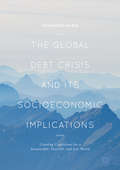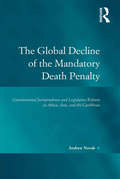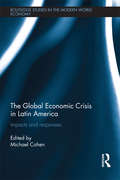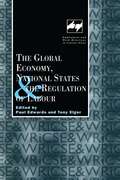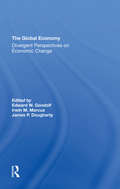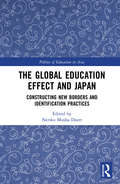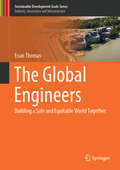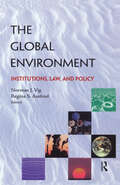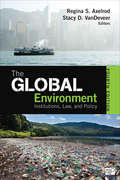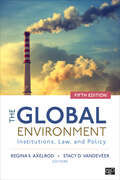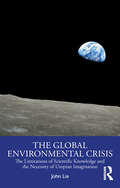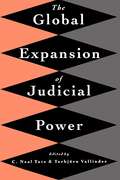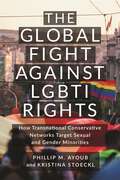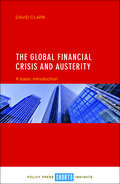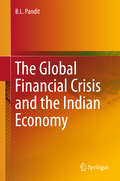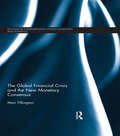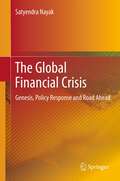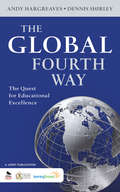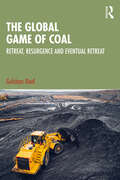- Table View
- List View
The Global Debt Crisis and Its Socioeconomic Implications
by Mohamed RabieThis fascinating and ambitious book proposes a new strategy ("the Ramo Plan") to tackle the current global socioeconomic crisis. Issuing a direct challenge to the status quo, the author lays out a bold set of policies to overcome the West-East divide and lead us to a more successful and secure future. Alongside the presentation of a new economic approach, this book provides a thorough survey of the major forces behind the decline in economic growth rates. It examines the state of the major world economies, explores the impact of the global debt crisis, identifies the income and wealth gaps in the United States and other countries, and explains the relationship between these issues and the spread of alienation, radicalism and terrorism. Imaginative and refreshing, this is valuable and original reading for students and academics interested in international political economy, economic development, sustainable development, and social economics, as well as global policy, area studies, globalization studies, and international relations.
The Global Decline of the Mandatory Death Penalty: Constitutional Jurisprudence and Legislative Reform in Africa, Asia, and the Caribbean (Law, Justice and Power)
by Andrew NovakHistorically, at English common law, the death penalty was mandatory for the crime of murder and other violent felonies. Over the last three decades, however, many former British colonies have reformed their capital punishment regimes to permit judicial sentencing discretion, including consideration of mitigating factors. Applying a comparative analysis to the law of capital punishment, Novak examines the constitutional jurisprudence and resulting legislative reform in the Caribbean, Sub-Saharan Africa, and South and Southeast Asia, focusing on the rapid retreat of the mandatory death penalty in the Commonwealth over the last thirty years. The coordinated mandatory death penalty challenges - which have had the consequence of greatly reducing the world’s death row population - represent a case study of how a small group of lawyers can sponsor human rights litigation that incorporates international human rights law into domestic constitutional jurisprudence, ultimately harmonizing criminal justice regimes across borders. This book is essential reading for anyone interested in the study and development of human rights and capital punishment, as well as those exploring the contours of comparative criminal justice.
The Global Economic Crisis in Latin America: Impacts and Responses (Routledge Studies In The Modern World Economy Ser.)
by Michael CohenWhen the 2008 housing market bubble burst in the United States, a financial crisis rippled from the epi-center in the United States across borders into economies both near and far, causing persistent social and economic detriment in many countries. The Global Economic Crisis in Latin America: Impacts and Responses is an examination of the impacts and responses in the diverse Latin American region through the lens of three countries: Mexico, Brazil, and Argentina.
The Global Economy, National States and the Regulation of Labour (Routledge Studies in Employment and Work Relations in Context)
by Paul Edwards Tony ElgerFirst published in 1999. Routledge is an imprint of Taylor & Francis, an informa company.
The Global Economy: Divergent Perspectives On Economic Change
by Edward W Gondolf Irwin M Marcus James DoughertyThis collection of contemporary essays addresses the imposing changes occurring in the global economy and presents thoughtful policy options for managing them. The debate among these experts vividly illustrates the dimensions and consequences of the new global economy for the U.S. population and suggests appropriate policies for mitigating its impact. Contrasting perspectives on the origin and trends of the current international economic order are offered. Each contributor presents a complex position in nontechnical terms and with helpful examples. The result is a work accessible to readers from a variety of professions.
The Global Education Effect and Japan: Constructing New Borders and Identification Practices (Politics of Education in Asia)
by Catherine Attard and Kathryn HolmesThis volume investigates the "global education effect"—the impact of global education initiatives on institutional and individual practices and perceptions—with a special focus on the dynamics of border construction, recognition, subversion, and erasure regarding "Japan". The Japanese government’s push for global education has taken shape mainly in the form of English-medium instruction programs and bringing in international students who sometimes serve as a foreign workforce to fill the declining labour force. Chapters in this volume draw from education, anthropology, sociology, linguistics, and psychology to examine the ways in which demographic changes, economic concerns, race politics, and nationhood intersect with the efforts to "globalize" education and create specific "global education effects" in the Japanese archipelago. This book will provide a valuable resource for anyone who is interested in Japanese studies and global education.
The Global Empire: Futurica Trilogy 2
by Alexander Bard Jan SöderqvistWhen the foundations of society goes through revolutionary changes, caused by new communication technologies, there will be consequences. <P><P> The old political conflicts and the old political ideologies disappear, replaced by new patterns that initially will be difficult to discern and to interpret...
The Global Engineers: Building a Safe and Equitable World Together (Sustainable Development Goals Series)
by Evan ThomasThe Global Engineers: Building a Safe and Equitable World Together, is inspired by the opportunities for engineers to contribute to global prosperity. This book presents a vision for Global Engineering, and identifies that engineers should be concerned with the unequal and unjust distribution of access to basic services, such as water, sanitation, energy, food, transportation, and shelter. As engineers, we should place an emphasis on identifying the drivers, determinants, and solutions to increasing equitable access to reliable services. Global Engineering envisions a world where everyone has safe water, sanitation, energy, food, shelter, and infrastructure, and can live in health, dignity, and prosperity.This book seeks to examine the role and ultimately the impact of engineers in global development. Engineers are solutions-oriented people. We enjoy the opportunity to identify a product or need, and design appropriate technical solutions. However, the structural and historical barriers to global prosperity requires that Engineers focus more broadly on improving the tools and practice of poverty reduction and that we include health, economics, policy, and governance as relevant expertise with which we are conversant.Engineers must become activists and advocates, rejecting ahistorical technocratic approaches that suggest poverty can be solved without justice or equity. Engineers must leverage our professional skills and capacity to generate evidence and positive impact toward rectifying inequalities and improving lives.Half of this book is dedicated to profiles of engineers and other technical professionals who have dedicated their careers to searching for solutions to global development challenges. These stories introduce the reader to the diverse opportunities and challenges in Global Engineering.
The Global Environment: Institutions, Law and Policy
by Regina S. Axelrod Norman J. VigAll serious environmental threats are now international in scope and more than one thousand international environmental agreements already exist. Yet the prospects for international cooperation leading to the management of impacts on the planet remain grim. The Global Environment meets the need for an authoritative assessment of the state of international environmental institutions, laws and policies at the end of the 20th century.The book examines disagreements over the meaning of sustainable development, problems inherent in implementing environmental policies and the conflict over the exclusion of developing countries from the Kyoto Protocol. It discusses the profound trade-offs that may be required, the role of international financial interests in promoting incompatible forms of development and analyses international environmental institutions, law and policy and sustainable development.
The Global Environment: Institutions, Law, and Policy
by Stacy D. Vandeveer Regina S. AxelrodThe new edition of Regina S. Axelrod and Stacy D. VanDeveer’s award-winning volume, The Global Environment: Institutions, Law, and Policy, reflects the latest events in global environmental politics and sustainable development while providing balanced coverage of the key institutions, issues, laws, and policies. The volume has been reorganized to better highlight global environmental institutions, major state and non-state actors, and includes an expanded set of cases such as climate change, biodiversity, hazardous chemicals, ozone layer depletion, nuclear energy and resource consumption. Based on reviewer feedback, the new edition broadens coverage of the growing global environmental agenda and explores the relationships between states, NGOs, and international organizations.
The Global Environment: Institutions, Law, and Policy
by Regina S. Axelrod Stacy D. VanDeveerThe new edition of Regina S. Axelrod and Stacy D. VanDeveer’s award-winning volume, The Global Environment: Institutions, Law, and Policy, reflects the latest events in global environmental politics and sustainable development while providing balanced coverage of the key institutions, issues, laws, and policies. The volume has been reorganized to better highlight global environmental institutions, major state and non-state actors, and includes an expanded set of cases such as climate change, biodiversity, hazardous chemicals, ozone layer depletion, nuclear energy and resource consumption. Based on reviewer feedback, the new edition broadens coverage of the growing global environmental agenda and explores the relationships between states, NGOs, and international organizations.
The Global Environment: Institutions, Law, and Policy
by Regina S. Axelrod Stacy D. VanDeveerThe new edition of this award-winning volume reflects the latest events in the in global environmental politics and sustainable development, while providing balanced coverage of the key institutions, environmental issues, treaties, and policies. The book highlights global environmental institutions, major state and non-state actors, and includes a wide range of cases such as climate change, biodiversity, hazardous chemicals, ozone layer depletion, nuclear energy and resource consumption.
The Global Environment: Institutions, Law, and Policy
by Regina S. Axelrod Stacy D. VanDeveerThe new edition of this award-winning volume reflects the latest events in the in global environmental politics and sustainable development, while providing balanced coverage of the key institutions, environmental issues, treaties, and policies. The book highlights global environmental institutions, major state and non-state actors, and includes a wide range of cases such as climate change, biodiversity, hazardous chemicals, ozone layer depletion, nuclear energy and resource consumption.
The Global Environmental Crisis: The Limitations of Scientific Knowledge and the Necessity of Utopian Imagination
by John LieThe Global Environmental Crisis presents a new perspective on our inattention and inaction in the face of a major crisis. We cannot proceed without scientific knowledge, but we cannot exclusively rely on it. What we need, in addition to scientific knowledge, is utopian imagination to make us understand the nature of the crisis and to suggest an alternative vision of a viable future. This book is an essential resource for students and instructors across the social sciences, especially sociology and environmental studies. It will also be a crucial and accessible text for general readers interested in climate change and how to imagine a better world for themselves and future generations.
The Global Expansion of Judicial Power
by Torbjorn Vallinder C Neal TateEssays examining the trend of expanding judicial powers in government around the world. In Russia, as the confrontation over the constitutional distribution of authority raged, Boris Yeltsin&’s economic program regularly wended its way in and out of the Constitutional Court until Yeltsin finally suspended that court in the aftermath of his clash with the hardline parliament. In Europe, French and German legislators and executives now routinely alter desired policies in response to or in anticipation of the pronouncements of constitutional courts. In Latin America and Africa, courts are—or will be—important participants in ongoing efforts to establish constitutional rules and policies protect new or fragile democracies from the threats of military intervention, ethnic conflict, and revolution. This global expansion of judicial power, or judicialization of politics is accompanied by an increasing domination of negotiating or decision-making arenas by quasi-judicial procedures. For better or for worse, the judicialization of politics has become one of the most significant trends of the end of the millennium. In this book, political scientists, legal scholars, and judges around the world trace the intellectual origins of this trend, describe its occurrence—or lack of occurrence—in specific nations, analyze the circumstances and conditions that promote or retard judicialization, and evaluate the phenomenon from a variety of intellectual and ideological perspectives.
The Global Fight Against LGBTI Rights: How Transnational Conservative Networks Target Sexual and Gender Minorities (LGBTQ Politics)
by Phillip M. Ayoub Kristina StoecklAn in-depth look at the global movement to curtail LGBTI rights—and how the LGBTI movement responds to itIn the past three decades, remarkable progress has been made in numerous countries for the rights of individuals marginalized due to their sexual orientation and gender identity. The advancements in LGBTI rights can largely be attributed to the tireless efforts of the transnational LGBTI-rights movement, forward-thinking governments in pioneering nations, and the evolving human rights frameworks of international organizations. However, this journey towards equality has been met with formidable opposition. An increasingly interconnected and globally networked resistance, backed by religious-nationalist elements and conservative governments, has emerged to challenge LGBTI and women's rights, even seeking to reinterpret and co-opt international human rights law.In The Global Fight Against LGBTI Rights, authors Phillip M. Ayoub and Kristina Stoeckl investigate this complex landscape, drawing from over a decade of in-depth fieldwork and over 240 interviews with LGBTI activists, anti-LGBTI proponents, and various state and international organization actors. The authors explore the mechanisms and strategies employed by the conservative transnational movement, seeking to understand its composition and the construction of its agenda.With a wealth of empirical evidence and insightful analysis, this book is a valuable resource for scholars, policymakers, activists, and anyone interested in understanding the ongoing global battle for LGBTI rights.
The Global Financial Crisis and Austerity: A Basic Introduction
by David ClarkGiven the huge impact of the 2008 financial crash and post-crash austerity on so many people’s lives, there is a need for a concise, accessible guide to its causes and its longer-term significance. Written by an expert in political science and straddling finance, economics and political science, this entry-level summary demystifies global finance and puts the financial crisis in its historical context. It also outlines the policy responses of Western governments to the crash and the ensuing recession and turn to austerity. Supplemented by an appendix with an A-Z glossary of key terms, processes and institutions, the book concludes by asking if the crisis is really over and outlines possible future scenarios, making it an impressive overview for anyone with little or no previous knowledge of the subject.
The Global Financial Crisis and the Indian Economy
by B. L. PanditAfter tracing the causes of the global financial crisis, the book focuses on two fundamental systemic issues connected with its manifestation: financial-sector regulation and the problem of the dollar-centric international monetary system, both of which have been widely cited among the important factors leading to the 2008 financial crisis. The important analytical question of monetary policy transmission during the crisis is discussed in depth with the help of appropriate econometric models. The effectiveness of India's monetary policy during the crisis is examined by specifying an econometric model, and the impact of the crisis on the Indian stock market is modelled on the basis of risk-enhancing and risk-mitigating features. In closing, the impact of the crisis on real sectors of the Indian economy is analysed in detail.
The Global Financial Crisis and the New Monetary Consensus: Global Financial Crisis And The New Monetary Consensus (Routledge International Studies in Money and Banking)
by Marc PilkingtonThe Global Financial Crisis has reshuffled the cards for central banks throughout the world. In the wake of the biggest crisis since the Great Depression, this volume traces the evolution of modern central banking over the last fifty years. It takes in the inflationary chaos of the 1970s and the monetarist experiments of the 1980s, eventually leading to the New Monetary Consensus, which took shape in the 1990s and prevailed until 2007. The book then goes on to review the limitations placed on monetary policy in the aftermath of the global meltdown, arguing that the financial crisis has shaken the new monetary consensus. In the aftermath of the worst crisis since the Great Depression, the book investigates the nature of present and future monetary policy. Is the Taylor rule still a satisfactory monetary precept for central bankers? Has the New Monetary Consensus been shaken by the Global Financial Crisis? What are the fundamental issues raised by the latter cataclysmic chain of events? How should central banks conceptualize monetary policy anew in a post-crisis scenario? Existing books have dwelt extensively on the characteristics of the New Monetary Consensus, but few have cast light on its relevance in a post-crisis scenario. This book seeks to fill this gap, drawing on the lessons from five decades of contrasted theoretical approaches ranging from Keynesianism, monetarism, new classical macroeconomics, inflation targeting and more recently, pragmatic global crisis management.
The Global Financial Crisis: Genesis, Policy Response and Road Ahead
by Satyendra NayakThe Financial Crisis, though originating in the US, is global and comparable with the Great Depression of the 1930s. The book takes both micro and macro view of the crisis. It examines the evolution of the global monetary system and looks at the crisis from a systemic angle. It examines the institutional changes in American capitalism and market mechanisms. The dynamics of the market and its cyclical characters are discussed. It examines the structural changes in the US economy. The role of globalization and international funds flow, their changing character and the growing interdependence among nations have been examined. At the micro level, the book discusses the subprime market and the gaps in the system that created the crisis. It deals with the supervisory structure and growing influence of the derivatives market and the synthetic products that are threatening the financial system. It also analyzes the fundamental changes in the global trading and payments patterns, which are influencing the US balance of payments and the US dollar. The secular changes in the structure of the US economy are impacting the global economy. The work deals with the measures taken to resolve the crisis both in the US and on a global scale. The reforms necessary to avoid the recurrence of the crisis are outlined. The study aims to underline these factors and draw a perspective for the US dollar. It is also proposed to draw a scenario for a more efficient and equitable global monetary system with a role for the US dollar along with a new vehicle for international payments and finance. This would also include the reform of the global economic system and the IMF. The special feature of the book is that it takes a holistic view of the problem. The systemic and macro issues are discussed in addition to its microanalysis.
The Global Football League
by Peter MillwardThis book tackles issues of globalization in the English Premier League and unpicks what this means to fan groups around the world, drawing upon a range of sociological theories to tell the story of the local and global repertoires of action emanating from the popular protests at Liverpool and Manchester United football clubs.
The Global Fourth Way: The Quest for Educational Excellence
by Professor Andrew Hargreaves Dennis L. ShirleyLearn from global lessons of successful educational change! Deep and lasting educational reform doesn’t happen overnight. This example-packed sequel to The Fourth Way draws upon inspiring examples unearthed by brand new research to challenge educational leaders, teachers, and policy makers to put proven strategies to work promoting student achievement and the high quality teaching that drives it. With striking success stories from diverse systems around the world, Hargreaves and Shirley discuss: The real-life, nitty-gritty challenges facing change leaders Stumbling blocks to enacting best principles and practices Developing and implementing a plan of action to overcome challenges to lasting change
The Global Fourth Way: The Quest for Educational Excellence
by Professor Andrew Hargreaves Dennis L. ShirleyLearn from global lessons of successful educational change! Deep and lasting educational reform doesn’t happen overnight. This example-packed sequel to The Fourth Way draws upon inspiring examples unearthed by brand new research to challenge educational leaders, teachers, and policy makers to put proven strategies to work promoting student achievement and the high quality teaching that drives it. With striking success stories from diverse systems around the world, Hargreaves and Shirley discuss: The real-life, nitty-gritty challenges facing change leaders Stumbling blocks to enacting best principles and practices Developing and implementing a plan of action to overcome challenges to lasting change
The Global Future of Higher Education and the Academic Profession
by Philip G. Altbach Gregory Androushchak Yaroslav Kuzminov Maria Yudkevich Liz Reisberg##description##
The Global Game of Coal: Retreat, Resurgence and Eventual Retreat
by Gulshan DietlCoal occupies a large share in the global energy basket. This book explores the ‘coal game’ within the context of shifting energy geopolitics, the ‘resource war’, and the debates over climate change and energy security.Politics is a prime arena for game playing. Collaboration, competition, confrontation, and their combinations are ingredients in bilateral and multilateral dealings. The book deciphers the interactions within the coal world by resorting to the time-tested term ‘global game’. Joe Manchin in the United States, Vladimir Putin in Russia, Scott Morrison in Australia, and Gautam Adani in Australia and India have been accomplished players in the game of coal. The book looks at the coal assets and policies of major oal exporters and importers like the United States, Russia, India, Australia, and China and provides insights into the fierce contestations involved both in local and global politics and commerce over coal, climate, and security. The author discusses the role coal has played in the industrialisation of nations, prescriptions to the problem of coaluse, and varied scenarios portraying its future.The third volume in a trilogy on the use of fossil fuels, this book on coal will be of great interest to students and researchers of energy studies, international relations, environment and climate change, energy and geopolitics, security, and strategic studies. It will also be useful to policymakers, legislators, and environmentalists.
